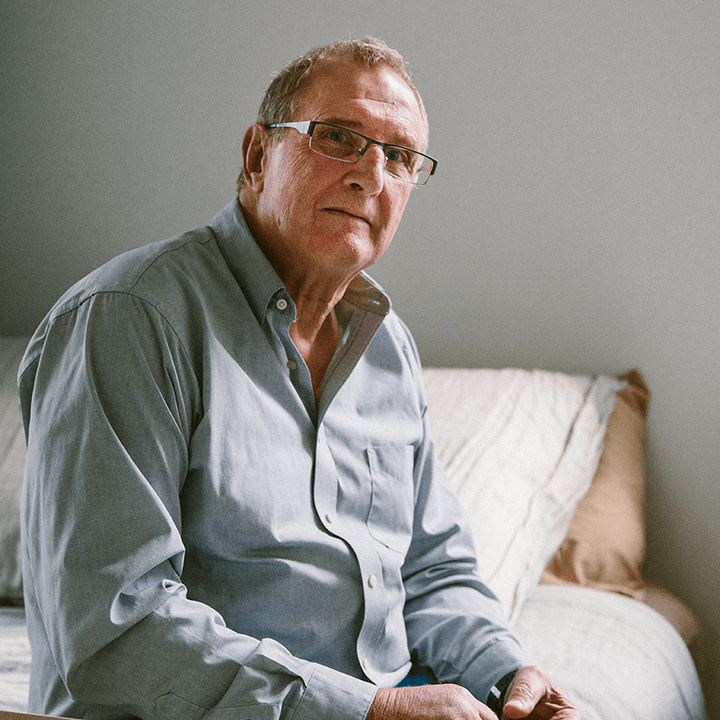Graeme's story
Graeme Holdsworth was a highly successful project manager behind some of Australia’s most iconic buildings, including Melbourne’s Crown Casino and Sydney’s 1 Martin Place. Renowned for his skills and achievements, Graeme seemed to have it all.
But under mounting stress, his behaviour began to change. He became short-tempered, yelled at staff and clients, and eventually found himself unemployed and divorced. Feeling hopeless, he decided it would be better for everyone if he wasn’t around.
Now, Graeme reflects on his experience and the steps he’s taken to rebuild his life. With over 80,000 Australians attempting or planning suicide each year and eight tragically losing their lives each day, Graeme shares the strategies that have helped him stay alive and find happiness again.
Listen here
Read transcript
Note: this transcript has been edited for clarity, grammar, and flow.
Beverley: Welcome to Lifeline’s Holding on to Hope, a podcast in which people who've suffered dark times share their stories of survival. Graeme Holdsworth has helped build some of Australia's most prestigious buildings. Depression, however, caused him to lose his career, reputation, and marriage until he finally decided it would be easier for everyone if he was no longer around. Graeme, now a grandad, explains the strategies he's learned to keep himself alive, while daughter Liza and mate Simon Coffin remind everyone of the importance of support.
Liza: When I think of good memories with Dad when I was little, it's being down the beach or being at the snow. And being at the beach, I used to love watching him on his wave ski because of the massive waves out the back. And you're a little kid, and you see your dad flying down these waves. And I just thought he was the best in doing that.
Graeme: I was the first person in my family to ever go to university. Uh, so I finally got into architecture and completed the course and graduated as an architect. It made my father very happy. Yes, I got married very early. Uh, in fact, uh, my final year at university, I was married and planned to have my first child in the first year after graduation. That’s how confident I was that someone was desperately about to employ me. I had three children from the first marriage; they were actually six years apart. When I first started as an architect, I found out that the person who had the best job was the client. Uh, so I got interested in the process of building rather than wanting to be a designer architect. What happens at the front end before an architect is employed, and what happens at the tail end when the building's finished and has to be commissioned, occupied, sold on, or whatever the process is.
So I headed off towards the development industry and worked for a couple of major developers for a long time and then ended up starting a project management practice on my own. And that led to me being involved at a fairly young age in a major development that somehow ended up a success. And for some reason, I got some of the credit for that, and therefore that set my path in my future career. From then on, it was large project after large project getting larger along the time. I kept putting my hand up and saying, can I have a small one? But no one would trust me with a small one. So the sorts of things I worked on were the Crown Casino. That took five years of my life in charge of the process there, right up to the construction. Uh, I went to Sydney for the Grollo group and did Number One Martin Place, which is the Sydney GPO, a Macquarie Bank headquarters, and the Western Hotel, uh, Convention Centre. Not just Jeff's Shed part of it, but the new part of the Convention Centre. So that's the sort of scale of projects that I was project director of. I really love my job. Uh, I love the processes. I love the people, the involvement, the excitement of it, the intensity, especially the larger ones. They can turn into 24/7 jobs without you really knowing. The people are fantastic. And the approach that we used to have to it, which was a collaborative approach. Everyone worked together for the success of it, reminding ourselves that the buildings themselves needed a champion. So we have to make sure the building was the best we can do for it. Um, it was great work, Partly because of the work and the fact that we were married early and a whole lot of other reasons, that marriage broke down.
Liza: Their divorce wasn't very amicable. I would say it was a bit messy, and I think just with little kids, you just sort of get caught up in it all. And, um, my dad had met someone else and started sort of a new beginning with her, and that kind of hurt us, I guess, or me. Um, so it was harder to see him, to know that he'd moved on to someone else. When you say little. Um, so I didn't see him for a long time.
Graeme: And I met the most beautiful lady who was in the sort of business we were in. She was the solicitor for a major firm that was working on some of the projects that I was working on. Uh, we fell in love, and that was the end of it for me again. Um, there was one child from that marriage. My wife was involved in planning issues, and we had that in common. There was local community work. Uh, we set up a group here that looked after inappropriate development in our own suburb. Uh, I did some work for planning policy for one of the political parties. Uh, so we were active. Together, we took on, uh, the saving of the Abbotsford Convent, which was designed for a... or they tendered it out for high-rise housing. Uh, in fact, my ex-wife got a pro bono award for the work she did there for saving it.
So it was those sorts of things that kept us busy and occupied. And the scale of work I was doing got bigger and bigger. Crown was in the middle of that one. Going to Sydney for two years for Number One Martin Place - that could have been a work-related problem because, uh, I went there on my own, and I commuted on a weekly or fortnightly basis. Uh, and our son was only four or five years old. So, I don't think that helped the relationship. In the last couple of major projects I was working on, I started to notice something strange happening. It attacked me in sort of layers, uh, a bit like putting on weight. You really don't notice it until someone says, 'Gee, you've put on some weight.' Uh, and that was what happened to me. I started to withdraw a lot more. I started to self-doubt a lot more. My management style started to change so that rather than talk through problems, I started disputes, yelled at people, and apportioned blame where we'd never done that before. There are two sides to the construction industry - the way to manage. One is to manage by fear. You yell at everyone, call them incompetent, useless, uh, and every mistake. And the other side is to accept that what you're doing is a one-off. Uh, it's a prototype using standard elements in it, but they've never been put together in that way before. And on big ones that run fast, someone's going to make a mistake. We always do. And I was going to make mistakes. So at the start, we got together and said, 'Right, let's open up about mistakes early. Let's work together. Let's make sure we can solve them before they become real problems.' And at the worst, what can happen? A bit more time and a bit more money. But at least we'll be open about it, and people will know it's coming. I noticed a change with me when I became a lot more like the management style that I detested so much—uh, going in, yelling at people, apportioning blame, withdrawing from the process. Um, it, it wasn't me.
One of the first signs that there was something wrong with me was when I started to withdraw. Withdrawal is a very large part of the process of people who are depressed. I'd withdraw from social occasions. I wouldn't go to work socials, uh, all the institute dinners and lunches and gatherings I used to go to, I used to be part of, used to be active in those organisations, I now withdrew from. I sent someone else along; I wouldn't bother to go. And I, I noticed that there was the anger, but I knew there was something really wrong when I became unreliable. You know, I can be on-site, I could be at a consultant's office, I could be in my own offices. Lots of places I can be. So I'd say I was on-site, but in reality, I was at home, struggling to get out of bed, struggling to leave the house, just total loss of vitality.
Liza: My half-brother Darcy (Dad’s, son from his next relationship) was at school, and his teacher I think knew my sister or something like that. And she said that he talked about us in class, and it just sort of hit me in the heart. I was like, 'Oh, you know, I didn't want him to think that we don't want anything to do with him, I guess.' So I just called up Dad, and Michelle and I, I think I just took Darcy bowling a few times or just caught up with him occasionally. And then they were looking for someone to be his nanny, and I was doing some studying at the time. So it just sort of worked. And then I just, I actually lived next door and looked after Darcy for a year. And Dad was there. But in hindsight now, he wasn't very available. And I took that on, I guess—that he wasn't available for me. But now I know that he just was sort of suffering in his own depression at that stage, which I didn't realise.
Graeme: After I'd noticed there was a change, I was actually visiting my GP for some other matter, and he said to me: "What's wrong with you, Graeme? You're not your chirpy self. You haven't even insulted me this morning like you usually do."
And I finally said, "Well, I don't know. There’s something happening. Yeah, I'm not who I used to be."
So he organised another meeting, and we had a longer chat. Uh, and then he sent me off to see his friendly psychiatrist, and out of all of that, it became very clear that I'd been hiding a desperate illness - that I was severely depressed. And I'd been hiding it partly by not talking to anyone about it, including myself, and using some avoidance techniques. I was drinking a lot more than I had been, and that was part of where the anger came from.
So in the end, there was a client who was probably the client from hell—who really wanted to run a project but didn't know how to. And I confronted him, and I told him the way he should approach the project and let people who know something about it, do it. I did it in a style that wasn’t me, and I hadn't prepared for it. I hadn't organised the politics. I hadn't organised the people surrounding me for support and so forth. And to tell you the truth, I'm not quite sure what I said. But when I went back to the desk, the people around me said, "Oh, there's a message. Pack up your desk; your contract's been cancelled. They want you out of here in two hours." So whatever it was, I got the message across. And initially, I thought, "Oh, well, yeah, bit of misjudgment on my part, never been sacked before. New experience. Roll with the punches."
But in reality, it was part of the change in me - this self-doubt. And this really gutted me. It proved all the things I'd been saying to myself: "You're useless. You're a fraud. You're no good. You've conned your way into this. You're going to get caught out sooner or later." And there was proof. I'd been caught out. I'd finally been. So yeah, I was far from well and far from rational. After I was removed from the project, I then had real problems getting back into the business. Part of it was because of my age - I was in my early sixties at that stage. So I had a long career, and there were lots of young kids snapping at our heels. Secondly, because the position I occupied - only very few people had the experience to fill that. So there's a fairly small cartel of people who knew, and they knew exactly what had happened to me. They knew why I wasn't in a job, and they knew I was suffering from mental illness. So the stigma was difficult. But the third and probably the real reason was my self-confidence wasn’t there. I just didn’t want to try anymore. Uh, it was a self-defeating attitude: "You're not good enough, so don't bother."
It was interesting. A lot of people in my profession gathered around me, offered me other positions, offered me assistance. But part of the withdrawal process is that you knock them back once, and they try again. They ask if they can do something, you knock them back the second time. Maybe they try again. You knock them back the third time, and you don't hear from them again. And then you end up saying to yourself, "See, no one loves me. No one wants me. I can't get work. I don't have any contacts." But the reality is you're not trying. And they've given up offering.
Simon: I met Graeme through one of my bike shops. At the time, I had maybe three bike shops in Melbourne, and I met him through the one in Richmond, just around the corner from where he lived. Yeah. Look, I started to realise he wasn’t doing so well when we had been to a few functions, birthday parties or whatever, at his house. And then it was made known to my wife and me that he and his partner weren’t getting along very well at all, and he definitely didn’t cope with that very well.
Over 12 to 18 months - I can’t remember the exact timeframe - but relatively quickly, it became quite a negative relationship. I think he was definitely adding fuel to the fire by drinking and so on. But yeah, it was well known to me that he was not in a good place within his relationship at home, and that deteriorated quite quickly.
My second marriage was a very happy marriage. It was a happy marriage for me. Now, I’m not quite sure if the tail end of that had been all that happy for my wife. She had lived through the changes in me that I really didn’t notice, and they’d maybe gone on for three or four years slowly. The two years away in Sydney didn’t help the matter.
Graeme: And in reality, there was no real appreciation of mental illness, about depression, and no real acceptance that it was a real, serious illness. So that was difficult. There was never really time to talk about the problem. The more bizarre and irrational my behaviour became—and it did; I must have been difficult to live with, the less we talked about it.
Simon: It took me by surprise a little bit. He was such a strong, successful male in society. He had done so much, achieved so much, and done so much for others throughout his life. He still did a lot of great stuff and had achieved a lot; he was called upon by lots of staff, involved in big building projects, and all sorts of stuff.
The long and short of it is, I was really surprised and taken aback that a person of that mindset and stature in society could end up in the situation he was in, where he was mentally so unwell.
Graeme: After I’d been removed from the project and my marriage had broken up, I was suffering very badly, and I started to have suicidal ideation. I actually came to the point where I thought I should act on it. I thought I’d be better off not being here. Everyone would be happy. I’d be less of a burden to people.
It was an irrational thought, but it felt logical and slow. It wasn’t agitated or out of anger or rushed. I planned it. I left a note. I got in my car. I put on a song that had some lines in it about feeling hollow, and that’s exactly how I felt - absolutely hollow. There was nothing in me; there was nothing left in me.
I went to our holiday house, sat at the dining room table, and in a very orderly fashion, wrote five or six suicide notes.
I’ve still got them, and when I read them back, they’re very rambly and somewhat illogical. But the sentiment was good in all of them, even though badly expressed. I addressed them, put them in a nice little pile, and then because I was trying to be orderly and not cause too much of a problem, though I knew it would cause a problem - I used the landline there to ring my own phone. I hadn’t taken my mobile with me.
I said, “If anyone’s looking for me, I’m under the veranda at the holiday house.” The next thing I knew, I was being saved by a couple of policemen.
Back in town, they had tried to find me. They’d been to the holiday house before I arrived and weren’t able to locate me. But they had my mobile phone, and when they got the message, they knew what to do.
The circumstances of my survival are coincidental if anything. I’m very pleased with those two policemen, who ended up saying—I think their opening words were, “I guess you’re surprised to see us here.” And I was.
Lifeline: Through connecting with others, we can hold on to hope. To speak to a crisis supporter, please call 13 11 14, 24 hours, seven days a week.
Liza: It broke my heart. You know, it's very sad. My reaction straight away was just to help him because my stepmother wasn’t there to help, and my brother was still young , and Dad didn’t really seem to have anyone. So, my first reaction was just to help him. And that’s pretty much what I did from that call, I think.
Graeme: Slowly, slowly, with the help of my psychiatrist and other interventions, like going into care, I got better. The interesting part of that is that going into a psychiatric institution isn’t the greatest place in the world to be—probably the last place you’d want to be—but it’s the one place you really feel safe. Every time I was feeling really, really bad, I’d put my hand up and say, “Take me back in.”
The compassion of the people there, the safety - even the other patients - there’s a link in that sort of institution. There’s an overwhelming feeling of everyone looking after each other.
Simon: I didn’t go into the hospital thinking everything was going to be all roses. I would go in and visit and talk about his treatment. He was having treatment that, you know, included things like getting his brain zapped on a weekly basis at one point - all sorts of different treatments.
I guess I wasn’t entirely aware of some of the things he was going through. I was concerned about how he was coping with it. But in saying that, when I visited him, he was never around me, overly happy, but he wasn’t really miserable either. He didn’t talk about wanting to end his life.
Graeme: During the process of my illness, I tried a lot of antipsychotic or antidepressant drugs. I also had three rounds of ECT electroconvulsive therapy. Both of those are very successful for most people.
The range of antidepressant drugs is huge, and every one of them can help different people in different ways. Unfortunately, they just didn’t work for me. ECT treatment can have resounding success for a lot of people, and there are terrific stories about that. But in my case, it didn’t help at all.
Liza: He was in the hospital for a while, so it was just about going and visiting him as much as I could. Then I moved into his house with him, back when he was on a lot of medication.
You know, it’s hard to understand how bad he was feeling at those moments. I don’t think I’ve really asked him what it was like. I think it’s just about knowing that it’s not a quick fix, and all you can do is hope.
Graeme: They put me back in the hospital, and they were going to wean me off the cocktail of drugs I was on and put me on an older one. In the first week, as they weaned me off the cocktail, I remember the psychiatrist came in, and I said, “I’m cured.” He asked, "What do you mean?"
I said, “My hands don’t shake anymore. I don’t have any chest pains. The zinging sound in my head is gone. My stomach feels fine - it doesn’t have all those knots in it the whole time.” And he goes, “Those are the side effects of all those drugs.”
So that’s what happens. They’re not major, but they’re there. The problem is if we don’t put you on something, there’s a chance you’ll go over the edge again - straight into deep depression. The psychiatrist said to me, because I had read widely about my illness, determined that if I was going to suffer from it, I was going to understand it he said, “Have you heard about acceptance and commitment therapy?”
I said, “Yes, I’ve got a book on that, The Happiness Trap by Dr Russ Harris, but I haven’t read it. I thought it was just another self-help book, and if I picked up one more self-help book that led me nowhere, I didn’t want to be there.”
The psych asked, “Well, why don’t you try it?”
When I got out of the hospital that time, I pulled it off the shelf and started reading. That’s when the lightbulb went off. Finally, I had an answer. I could understand the process. I could see a way forward. Now, I’m a devotee of acceptance and commitment therapy (ACT).
ACT works on the principle that all emotions are real. One of the problems with mental illness is avoidance - you don’t want to feel bad, so you try to avoid it. Avoidance can involve drugs, alcohol, or just doing something to distract yourself. Acceptance and Commitment Therapy teaches you to accept those feelings.
It says, “Let them be there. Give them some space. Look at them. Give them shape and colour. Breathe through them.” Eventually, you realise that they change, and they don’t last forever. Nothing does.
The second part is dealing with thoughts. Thoughts are just words in your head—random, meaningless words. They’re not necessarily true, even though we often believe they are. The philosophy of ACT is that it doesn’t matter whether thoughts are true or false, right or wrong. The only question is: are they helpful? If they’re not, let them go.
ACT gives you exercises to help with this, like imagining a stream and placing your thoughts on leaves to let them float away. The key is mindfulness - being present in the moment.
When you’re depressed, you dwell on the past: “Look how bad it’s been.” Then, you project that into the future: “It’s going to be this way forever.” But mindfulness teaches you to focus on now. Right now, I’m OK. I’m with friends and the sun is shining. Life is a series of moments. Stop living in the past or worrying about the future - just be in the present.
Once I embraced it, I really leaned into it. I even attended seven-day meditation retreats with five days of noble silence. It was brutal. Up at 4 a.m. and meditating until 9 p.m. But it reinforced the importance of staying present.
There’s also an emphasis on neuroplasticity, which is rewiring your brain, breaking old habits, and forming new ones. To help with that, I decided to learn something new. For me, it was the piano.
My hands weren’t exactly made for piano. They’re large, and sometimes one finger lands on two notes. The coordination of both hands while reading music seemed impossible, but I took it up anyway. I remember my daughter walking in one day, listening to me play, and saying, “We think you’re playing Imagine by John Lennon.” I said, “Good, because that’s what I’m trying to play!”
Part of the challenge with mental illness is that as your mental health spirals down, your physical health often follows. Poor diet, lack of sleep, too much alcohol, and no exercise become the norm because you don’t have the vitality to do anything differently. Suddenly, you’re dealing with physical health issues on top of everything else.
The way back is to tackle both mental and physical health together or even start with the physical. Eating well, getting enough sleep, and moving your body can lay the groundwork for healing.
One of the principles of ACT is to act on your values. Family, friends, work, leisure, whatever matters most to you. Those are the things to focus on. When you’re at your lowest, reconnecting with your values can help.
For me, fitness and health were important values. I used to ride bikes but had let mine collect dust. So, I pulled them out, dusted them off, and started riding again.
Simon: I’ve run shop rides at my bike stores for nearly 30 years, and Graeme’s been part of that community for 17 or 18 years now. We’ve always encouraged each other and teased each other if we didn’t show up for a ride.
Our shop ride community is incredible. Everyone knows Graeme, and they’re all so supportive. Cycling has been a huge part of his journey. It’s helped him reconnect with people and rediscover joy.
Graeme: Of course, I’m getting older, and the younger riders are faster, so I get dropped more often now. There’s exhaustion, pain, and some suffering, but there’s also joy. Being reasonably fit again is a great feeling.
The camaraderie from those rides helped pull me out of withdrawal. I started saying “yes” to social invitations instead of “no.” My old habit was to decline and find an excuse. Now, I go. If it’s not what I want, I can always leave. But I don’t avoid social contact anymore.
Simon: Graeme and I have built a strong bond over the years. He’s become a bit like a father figure to me since I lost my own dad. Our relationship just works; it’s one of those connections where everything clicks.
Graeme: For anyone struggling with depression or anxiety, my message is simple: there’s hope. These challenges are complex but not insurmountable. They can be managed, and life can get better.
The key is to reach out early. I made the mistake of not seeking help when I first started feeling unwell and again when I was having thoughts of suicide. Early intervention is so important.
Strengthening your connections with friends and family helps, too. Let them know what you’re going through. Starting the conversation is hard, but it can make a big difference.
If you’re supporting someone who’s struggling, my advice is to really listen. Don’t assume you know how they feel or offer quick fixes. Ask open-ended questions like, “How are you feeling?” or “What’s been going on for you?”
Simon: Sometimes, all you need to do is show up and be there for someone.
Graeme: I reconnected with my middle daughter through cycling, too. She started riding again, and we ended up in overlapping groups. That led to us spending more time together, and she met her partner through the cycling community. Now, they have two beautiful children, and I’m proud to be their grandfather.
Liza: When I look at my kids, I see parts of my dad in them. They won’t know what they’re missing because he’s here, and he’s part of their lives. That makes me so happy.
Graeme: Now that I’m well again, I’ve rediscovered the joy in life. It’s the small things that matter most.
Liza: (30:56)
The things I love most in life: being at the beach, swimming, skiing, cycling ... They all come from Dad.
Beverley: Thank you for listening to Holding On to Hope. Lifeline Australia is grateful to all our interviewees who share their stories to inspire others.
If you found this podcast helpful, please share it, rate it, or subscribe wherever you listen to podcasts. If you need crisis support, call Lifeline on 13 11 14 or visit lifeline.org.au.





